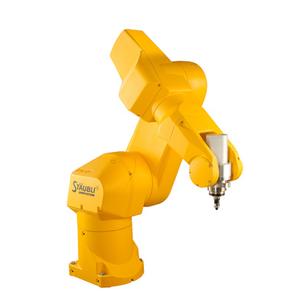For six months, Stâubli has been involved in a major project initiated by Cetim. This is to test a new industrial solution: the machining robot.
A multi skills experience:
Stâubli participates in this great project by bringing several technological innovations. Thus, the robot RX170 HP integrates directly into the forearm a Precise-Fisher electro spindle. This adaptation greatly improves rigidity.
In addition, the harness including power, cooling and lubrication of the unit passes completely into the arm without any external conduit. The robot is also pressurized, allowing to evolve in difficult conditions.
The teamwork carried out by all the collaborating companies on the robot plant is unique. Designed by Segula, the highly rigid cell in which the robot is installed reduces vibrations with its machined, welded and sand-filled frame.
Delcam software editor works on the generation of the five-axis arm trajectory, while Alma converts the FAO files into robotic language and simulates them to validate the routes.
High-level technological objectives:
By this operation, Cetim is primarily interested in the precision of machining accessed by the robot. The aim is to get closer to the +/- 0.04 mm repeatability of the standard RX170 HP robot. A challenge to be faced during the two-year test that takes place at Cetim de Senlis.
Thanks to its characteristics (17 kW, 42.000 rpm), the PreciseFisher electro-spindle can be used to machine parts at very high speeds. It is also possible to adapt pins with different technical characteristics in terms of power, speed, ...
The specifications are well filled. Work on numerical control, development of cutting conditions, tests on a large number of materials (wood, stone, stainless steel, aluminum, steel, composite, resin, glass ...), with or without lubrication, Approaching extreme machining conditions.
Extensive application fields:
In addition to its remarkable performances, this robot planter will be very well placed on the market, both in investment and in operation. This advantage enables the workshops to envisage the realization of various machining operations (contouring, trimming, welding bead machining, prototyping, polishing, drilling, tapping, etc.). This is a scalable solution that accompanies application changes in production.
Launched officially at the Industrie 2008 fair in Paris, this robot will find its place in many sectors of activity: automotive industry, watchmaking, glass processing, wood but also in nuclear (for maintenance operations) The aeronautics or the railway, ...
A multi skills experience:
Stâubli participates in this great project by bringing several technological innovations. Thus, the robot RX170 HP integrates directly into the forearm a Precise-Fisher electro spindle. This adaptation greatly improves rigidity.
In addition, the harness including power, cooling and lubrication of the unit passes completely into the arm without any external conduit. The robot is also pressurized, allowing to evolve in difficult conditions.
The teamwork carried out by all the collaborating companies on the robot plant is unique. Designed by Segula, the highly rigid cell in which the robot is installed reduces vibrations with its machined, welded and sand-filled frame.
Delcam software editor works on the generation of the five-axis arm trajectory, while Alma converts the FAO files into robotic language and simulates them to validate the routes.
High-level technological objectives:
By this operation, Cetim is primarily interested in the precision of machining accessed by the robot. The aim is to get closer to the +/- 0.04 mm repeatability of the standard RX170 HP robot. A challenge to be faced during the two-year test that takes place at Cetim de Senlis.
Thanks to its characteristics (17 kW, 42.000 rpm), the PreciseFisher electro-spindle can be used to machine parts at very high speeds. It is also possible to adapt pins with different technical characteristics in terms of power, speed, ...
The specifications are well filled. Work on numerical control, development of cutting conditions, tests on a large number of materials (wood, stone, stainless steel, aluminum, steel, composite, resin, glass ...), with or without lubrication, Approaching extreme machining conditions.
Extensive application fields:
In addition to its remarkable performances, this robot planter will be very well placed on the market, both in investment and in operation. This advantage enables the workshops to envisage the realization of various machining operations (contouring, trimming, welding bead machining, prototyping, polishing, drilling, tapping, etc.). This is a scalable solution that accompanies application changes in production.
Launched officially at the Industrie 2008 fair in Paris, this robot will find its place in many sectors of activity: automotive industry, watchmaking, glass processing, wood but also in nuclear (for maintenance operations) The aeronautics or the railway, ...
